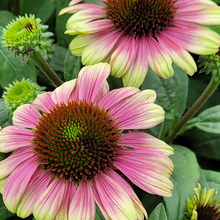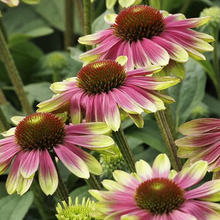Echinacea 'Sweet Sandia' is a vibrant coneflower cultivar named for its watermelon pink and lime green bicolor blooms that appear in abundance throughout summer. Its sturdy upright stems resist flopping and make it a long lasting cut flower. The unique coloring matures with a multi toned ombre effect, adding visual depth to garden beds and attracting pollinators in every phase of bloom. Strong branching and a compact habit make it suitable for massing or as a striking focal point in mixed borders.
Height & Spread: 20 - 24 in x 18 - 24 in
Bloom Time: Midsummer to early fall
Light Requirements: Full sun
Soil Preference: Well drained, moderately fertile soil
Watering Needs: Low to moderate; tolerates dry spells once established
Deer Resistance: Deer tend to avoid due to coarse foliage and scent
Native Status
This cultivar is derived from native North American coneflowers but is itself a garden hybrid developed for ornamental use.
WILDLIFE & INSECTS
Butterflies
- Attracts a wide range of butterflies such as Monarchs, Eastern Tiger Swallowtails, Painted Ladies, and Pearl Crescents.
Bees
- Visited by native bumblebees, sweat bees, long horned bees, and honeybees for its nectar and pollen throughout the growing season.
Moths
- Provides nectar for nocturnal moths including Sphinx moths and owlet moths during dusk and evening hours.
Birds
- Goldfinches and other small songbirds feed on the seed heads in fall and winter when left standing.
Spacing & Landscape Use
Spacing Recommendations
- Space 18 - 24 in apart to allow for air circulation and full flowering without crowding.
Landscape Placement
- Excellent in pollinator gardens, perennial borders, naturalistic meadows, and cut flower beds. Works well in mass plantings or mixed with ornamental grasses and other sun loving perennials.
Companion Plants
- Coreopsis verticillata 'Zagreb' (Threadleaf Coreopsis) - Adds feathery foliage and bright golden blooms that contrast with the bicolor tones of Echinacea.
- Rudbeckia fulgida 'Goldsturm' (Black Eyed Susan) - Shares bloom time and attracts the same pollinators while offering bold yellow flowers for contrast.
- Salvia nemorosa 'Caradonna' (Wood Sage) - Offers vertical blue purple spikes and aromatic foliage that pairs well with Echinacea’s upright habit.
- Lavandula angustifolia (English Lavender) - Contributes fragrant foliage and pale purple blooms that echo the cool tones in Sweet Sandia’s flower center.
- Allium schoenoprasum (Chives) - Adds edible ornamental pink purple flower heads and fine foliage for a soft texture contrast.



